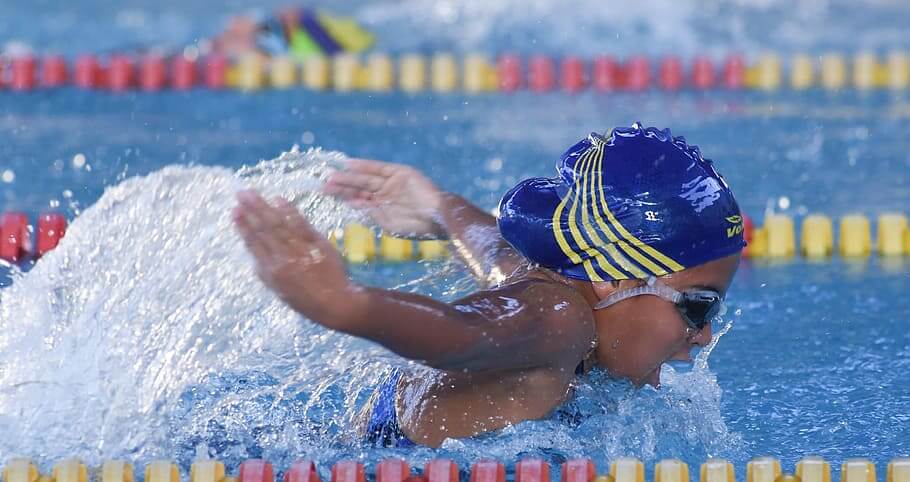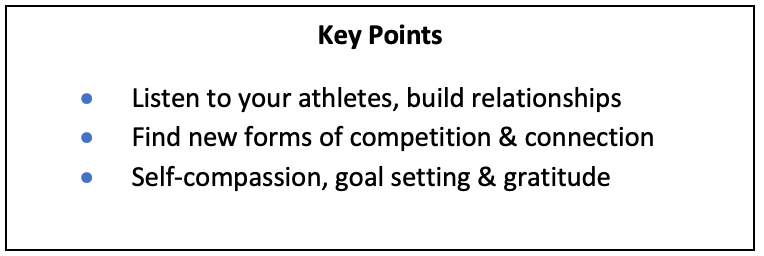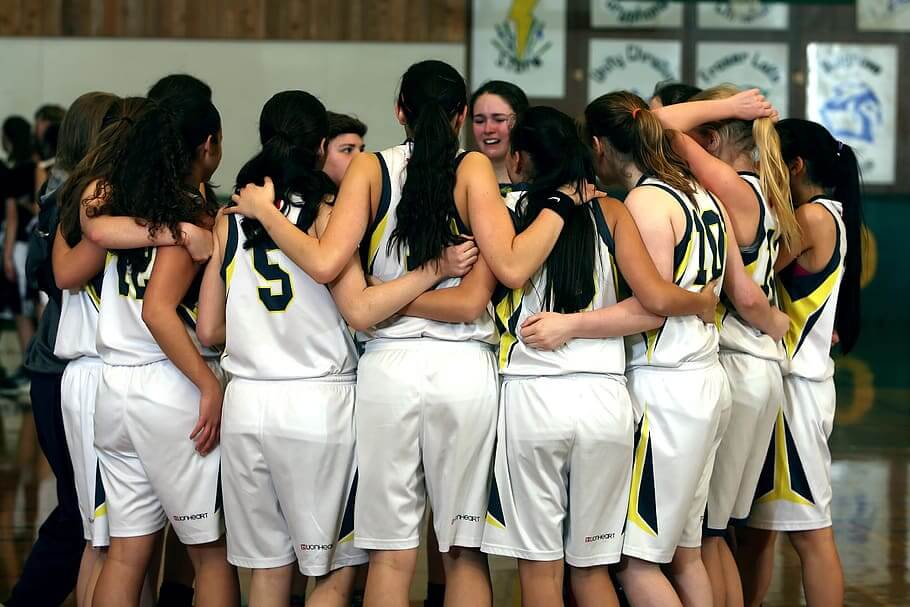
Sport Psychology in Action: 4-Part Article Series Connecting Research to Practice
A lot has changed in sports during 2020. Coaching in a COVID-19 world has shifted to online platforms and away from in-person interactions. Games, competitions and races have been put on hold for an indefinite time. For an athlete, the inability to work on attaining their goals can be very demotivating and this disruption can lead to a lack of focus, a sense of loss, or a need to reassess their athletic identity. Some athletes might even want to leave their sport altogether. Negative emotions such as disappointment, fear, loss, anger, frustration and confusion are normal responses during times of uncertainty. While each athlete manages their emotions in different ways, some athletes may have a harder time focusing on training and long-term goals when they do not know when their next race will occur. Coaches can help with this by providing guidance and encouragement.
As a coach, this sudden change in the sport environment has demanded flexibility in coaching practices. Coaches have pivoted to teaching coping strategies and maintaining athlete motivation instead of concentrating on teaching sport-specific skills. In addition to the numerous challenges faced during the current pandemic, coaches have been presented with a unique opportunity to build stronger relationships with their athletes and within their team.

How a coach can help their athletes stay motivated
To keep athletes involved in sport, and to help them stay motivated, it is important to emphasize personal connections and let them know they can share their concerns and fears and that their voices will be heard. Coaches can help athletes remember that they are not alone in this experience and it will not always be like this. However, instead of only dwelling on the negatives, a coach can talk to athletes about the reasons they started their sport, what they enjoy about it, and their hopes for the future. By listening to their concerns while emphasizing the positive aspects of why they are playing, the coach is letting their athletes know that their fears are normal and that they care.
To accentuate connections within the team, hold online skill development sessions and help athletes engage in teambuilding by connecting with teammates in an informal fashion. Examples of team building include forming an online book club, creating a forum for athletes to share their thoughts and ideas, holding online or physically distanced workouts, or using an online platform to watch a movie together, have a team dinner, or play a game. Within sport, with no races, athletes could find creative ways to gauge their progress such as individual time trials, participation in virtual races, or challenges. It is important that the coach focuses on the ways their athletes and their team can improve rather than focus on missed events.

In addition to team building, helping athletes focus on their individual well-being is paramount. Three areas that can be part of maintaining individual well-being, as well as increasing athlete engagement, include self-compassion, goal setting and gratitude. All of these place emphasis on a positive outlook and acceptance.
Self-Compassion
Self-compassion is showing the same level of compassion to one’s self as one would give to others in tough times. Self-compassion is related to feelings of well-being, positive self-esteem and connection, as well as decreased levels of both anxiety and depression. Coaches can help their athletes focus on the three main elements of self-compassion which include: 1) self-kindness (instead of self-judgment); 2) common humanity (instead of isolation) by reminding athletes that everyone is experiencing the same challenges right now; and 3) mindfulness (instead of over-identification) so any negative emotions do not become suppressed or exaggerated, and instead helps athletes take a big picture look at their circumstances.
Goal setting
Goals are a reminder to keep going when things get tough, and they promote flexibility and creativity in solving problems. While there are never guarantees that we will meet our goals, it is a coach’s job to help athletes remember that the journey itself will bring life more meaning. In what might seem like an impossible timeline to work with, goals will help break down uncertainty into smaller bite-sized pieces. These smaller goals can help reduce athletes’ anxiety and feelings of uncertainty, as well as increase motivation, feelings of control, and enjoyment. Coaches can work with their athletes to set SMART (specific, measurable, achievable, realistic and timely) goals. Goals should be related to things an athlete can actually work on right now considering their situation and should focus on what they hope to accomplish when things get back to normal.

Gratitude
Gratitude is expressing appreciation for the things one has. While there has been much loss over the past year, there will also always be things for which to be grateful. Gratitude has been found to be associated with increased life satisfaction and overall well-being, and a reduction in burnout. Coaches should encourage their athletes to think about things for which they are grateful on a regular basis to allow a focus on the positive aspects of the world. Some activities that can increase gratitude is to have athletes write gratitude letters to others whether they send them or not (e.g., writing a letter to someone who has made an impact on their life like a teacher or family member or to someone they have never met such as a person serving in the armed forces), daily gratitude journal writing, or sharing things they are grateful for at the beginning of any meetings or training sessions with other athletes. By doing this, athletes will form a consistent practice of finding gratitude and positive thinking each day.
 While athletes have missed out on a lot during this past year, a coach can help them be more than ready when their competitions resume. A coach can use this challenging time as an opportunity to make a positive difference and provide athletes skills that will impact them long after their time on the competitive field is over.
While athletes have missed out on a lot during this past year, a coach can help them be more than ready when their competitions resume. A coach can use this challenging time as an opportunity to make a positive difference and provide athletes skills that will impact them long after their time on the competitive field is over.
References
Brown, J., Wong, J., (2017, June 6). How Gratitude Changes You and Your Brain. Greater Good. https://greatergood.berkeley.edu/article/item/how_gratitude_changes_you_and_your_brain
Byrd, M., et al., (2020, March 19). The COVID-19 Pandemic: Tips for Athletes, Coaches, Parents, and the Sport Community. Association for Applied Sport Psychology. https://appliedsportpsych.org/blog/2020/03/the-covid-19-pandemic-tips-for-athletes-coaches-parents-and-the-sport-community/
Coatsworth, J. D., & Conroy, D. E. (2009). The effects of autonomy-supportive coaching, need satisfaction, and self-perceptions on initiative and identity in youth swimmers. Developmental psychology, 45(2), 320.
Gabana, N. T., Steinfeldt, J. A., Wong, Y. J., & Chung, Y. B. (2017). Gratitude, burnout, and sport satisfaction among college student-athletes: The mediating role of perceived social support. Journal of Clinical Sport Psychology, 11(1), 14-33.
Horn, T. S. (2008). Advances in Sport Psychology. Human Kinetics.
Mead, E., (2020, Dec 10). What are Negative Emotions and How to Control Them? Positive Psychology
https://positivepsychology.com/negative-emotions/
Mosewich, A. D., Kowalski, K. C., Sabiston, C. M., Sedgwick, W. A., & Tracy, J. L. (2011). Self-compassion: A potential resource for young women athletes. Journal of sport and exercise psychology, 33(1), 103-123.
Neff, K., Three Elements of Self-Compassion. Self-Compassion. https://self-compassion.org/the-three-elements-of-self-compassion-2/
Ntoumanis, N., Healy, L. C., Sedikides, C., Duda, J., Stewart, B., Smith, A., & Bond, J. (2014). When the going gets tough: The “why” of goal striving matters. Journal of Personality, 82(3), 225-236.Psychology Today. (2021). Gratitude.
https://www.psychologytoday.com/us/basics/gratitude


